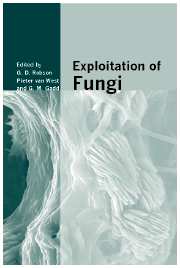
-
Select format
-
- Publisher:
- Cambridge University Press
- Publication date:
- 05 October 2013
- 24 May 2007
- ISBN:
- 9780511902451
- 9780521859356
- Dimensions:
- (228 x 152 mm)
- Weight & Pages:
- 0.704kg, 350 Pages
- Dimensions:
- Weight & Pages:
- Subjects:
- Plant Sciences, Life Sciences, Microbiology and Immunology
- Series:
- British Mycological Society Symposia (26)
You may already have access via personal or institutional login- Subjects:
- Plant Sciences, Life Sciences, Microbiology and Immunology
- Series:
- British Mycological Society Symposia (26)
Book description
The fungi are a highly diverse kingdom of eukaryotic microbes. Recent advances in molecular genetics, together with the release of whole genome sequences of an increasing number of fungi, are facilitating their exploitation and commercialisation. Fungi have the ability to secrete large quantities of proteins of commercial value, and their complex secondary metabolic pathways produce a diverse range of bioactive compounds which have had a major impact in the pharmaceuticals market. In addition, the fungi themselves are increasingly being developed as alternatives to conventional chemically-based pest control strategies, and as bioremediation agents capable of transforming pollutants in the soil environment. With chapters written by international experts, this volume highlights current and future biological, biochemical, and molecular exploitation of the fungi in biotechnology. It will have broad appeal, not only to mycologists and microbiologists, but also to biomedical scientists, biotechnologists, environmental and molecular scientists, plant pathologists and geneticists.
Reviews
'… this will be a useful addition to college and university libraries where applied mycology is taught.'
Source: Mycological Research
Contents
Metrics
Full text views
Full text views help Loading metrics...
Loading metrics...
* Views captured on Cambridge Core between #date#. This data will be updated every 24 hours.
Usage data cannot currently be displayed.
Accessibility standard: Unknown
Why this information is here
This section outlines the accessibility features of this content - including support for screen readers, full keyboard navigation and high-contrast display options. This may not be relevant for you.
Accessibility Information
Accessibility compliance for the PDF of this book is currently unknown and may be updated in the future.


